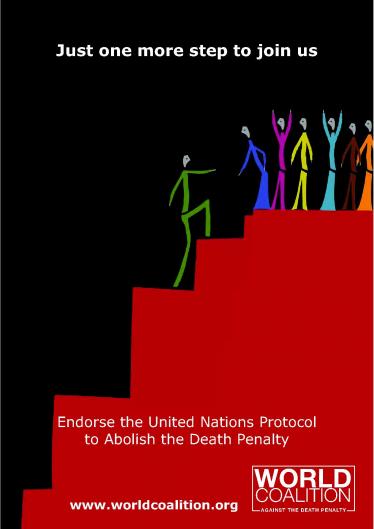
Sharing best practices on ratifying the UN treaty to abolish the death penalty
Protocol
“To mark the twentieth anniversary of the entry into force of the Second Optional Protocol to the International Covenant on Civil and Political Rights in July 2011, States should multiply their efforts to secure increased ratification of this international human rights instrument” stated the report of the UN Secretary General on the death penalty that was presented during the 18th session of the Human Rights Council in Geneva.
To answer this call, Belgium organized a panel discussion on “Sharing best practices on ratifying the Protocol” with the support of the Office of the High Commissioner for Human Rights and the World Coalition against the Death Penalty on 19 September.
In her opening statement, Mona Rishmawi, Chief Rule of Law of the Office of the High Commissioner for Human Rights said: “About 140 of the 192 States Members of the United Nations are believed to have abolished the death penalty or introduced a moratorium either legally, or in practice. However, only 73 States have ratified the Second Optional Protocol to the International Covenant on Civil and Political Rights.”
“The Protocol is making progress”
Marc Bossuyt , President of the Belgian Constitutional Court, and former special rapporteur responsible for drafting the Second Optional Protocol recalled that the vote for the adoption of the Protocol by the United Nations General Assembly in 1989 was “difficult” and that only 59 countries had voted in favor. 20 year later, progress has been made as 73 states have ratified and more states are considering ratifying it.
Mongolia is among them and Chuluunbaatar Sosormaa, Human Rights Policy Advisor to the President of Mongolia explained that a bill has been presented to the Parliament in June this year but the discussion was postponed. “International support is very important, especially from the UN, the EU and the worldwide movement. Recent abolitions in Russia and ratifications in Central Asia are also very good examples for Mongolia.”
Noura Borsali, a member of the Tunisian High Instance for the Revolution said that since the revolution, the question of the ratification of the Protocol has been discussed and she was confident that it will be further discussed either by the transitional government or after the adoption of the new constitution.
She also recognized that civil society, and especially the Tunisian Coalition against the Death Penalty, has been first in raising the issue.
Christoffel Heyns, Special rapporteur on extrajudicial, summary or arbitrary executions insisted that the Protocol was important as it was the only UN legal framework that clearly banned the use of the death penalty.







